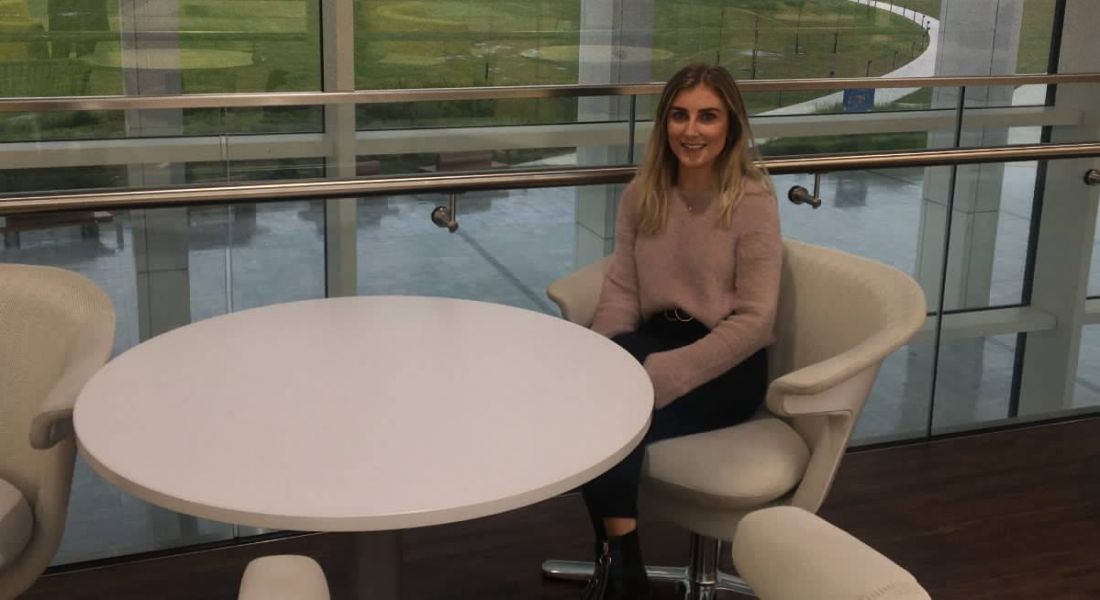Hazel Harford of BMS discusses her experience of the company’s graduate programme.
Whether you’re certain about the route you want to take after your college degree or not, graduate programmes can be a valuable stepping stone.
Science graduate Hazel Harford, who is working at biopharmaceutical company Bristol-Myers Squibb (BMS), told Siliconrepublic.com about her passion for meaningful work and how she braved the graduate programme’s 12-hour night shifts with a “bare face”.
What did you study in college?
I studied genetics and cell biology in DCU. My degree focused on cell biology, underpinning the fast-growing biopharmaceutical industry, and genetics, equipping me with in-depth knowledge of gene cloning, gene expression and recombinant DNA technology.
I took an industry stream in final year, which involved a closer look at the biopharmaceutical industry today.
With this programme, are you now working in your desired industry?
Yes, learning about innovative medicines and the biopharmaceutical industry in college sparked a real interest in me. Upon finishing my degree, I knew exactly what direction I wanted to go.
The fact that an antibody expressed in Chinese hamster ovary cells can ultimately save a person’s life amazed me and I wanted to be part of it!
What drew you to BMS when you were seeking work as a graduate?
I was lucky enough to work in BMS for my third-year internship for college, which was my first insight into the biologics industry.
My experience as a student in BMS was extremely positive. I was impressed by the friendly and inclusive culture, the innovative environment and career development opportunities. Throughout the summer I watched the biologics site grow and attended the opening ceremony before I went back to college.
From that point on, I was determined to come back and work in this state-of-the-art facility, helping to make transformational medicines.
What expectations did you have before you began the programme at BMS?
I suppose because I had been here on an internship, I had some insight into what to expect.
People already knew me, so I expected to have some more responsibility and flexibility with work, more input and training from managers and senior leaders, and the chance to connect with people across different functions, giving opportunities to work on cross-functional projects.
What duties and responsibilities were you given initially?
I began my quality assurance (QA) training straight away and as soon as I was competent enough, I was given responsibility to complete day-to-day tasks. Training is rolled out in a phased approach at BMS. The more competent and experienced you become, the more duties and responsibilities you are given.
My manager had outlined to me from the start what my responsibilities would entail for the next few months, including document review and approval, inspection and disposition of materials on site for use in manufacturing.
I also had the opportunity to work on a site process improvement project and to review paper batch records.
Did the scope of your work change as the programme progressed?
Yes, while in quality assurance, I spent a lot of my time involved in a raw material release process redesign and improvement project, which developed over time. At the moment I am getting experience in buffer preparation. I hope to get experience in purification in the latter end of this rotation.
I have also been trained on systems such as SAP, DeltaV and MES.
Can you describe a typical day in your role?
While working as a downstream bio-process associate, I am on 12-hour shifts for nine months. Our handover begins at seven in the morning, at which point our shift lead organises the team into groups to perform the day’s tasks.
For example, we could be asked to start a large buffer make-up and would need to follow the corresponding standard operating procedures (SOP) and paper batch record. Depending on the buffer being made, we could need to take samples or measure such aspects as pH and conductivity.
Once the buffer is made and mixed, we then transfer it to the required buffer hold vessel. An activity like this could take a whole 12-hour shift.
How do your responsibilities compare to more experienced employees?
I am given responsibility based on my completed training and competence. I am not treated any differently because I am on the graduate programme. I look up to the subject matter experts and try to learn as much as I can from them.
Everyone makes time to explain a task or process to me, no matter how busy they are. There’s a lot to learn, especially in manufacturing as it is such a different and high-paced environment, it can be quite overwhelming at the beginning.
The help and support of co-workers and my graduate mentor has been a vital part of my learning and growth in this role.
Do you feel more prepared for working life after completing this programme?
I am a year into the programme now and have already learned a lot about what type of role may suit me after.
I feel like I am getting a well-rounded view of the industry landscape and indispensable knowledge that I will carry throughout my career.
Why should someone apply to the graduate programme at BMS?
It is an amazing opportunity to effectively get a taste of the working world, but also help steer you in your career. On the BMS graduate programme, you have the opportunity to experience three different departments of interest over 27 months. This has helped me learn a lot about myself so far.
QA is a department I would never have considered myself working in. However, I felt the graduate programme was an ideal opportunity to get experience in this area, which I use every day in my new role.
As someone who always wore make-up and jewellery and had no experience with working with tools, I was very nervous. Manufacturing shift is a whole new world. Working nights (and doing it bare-faced) is very daunting! But I am so glad I took the plunge, I am totally comfortable with it now and the hours don’t really faze me.
In final year, I knew I wanted to work in the biopharmaceutical industry, I just wasn’t sure what department. Therefore, a rotational programme was ideal. The BMS graduate programme comes with lots of perks such as active management and mentoring, working with cross-functional teams, exposure to senior leaders and team involvement.
If you are passionate about the biopharmaceutical sector, career-driven, energetic and collaborative, you should strongly consider the BMS graduate programme to kick-start your career.
BMS Ireland’s 2020 graduate programme closes for applications on Friday 25 October.




